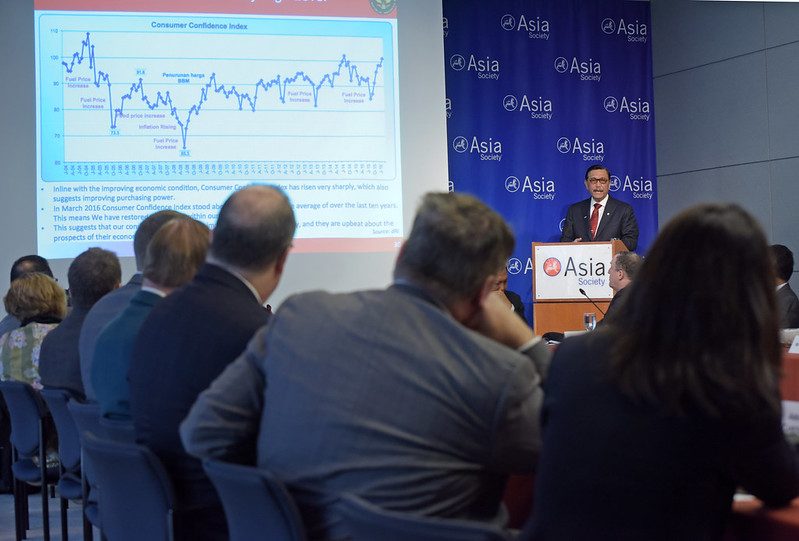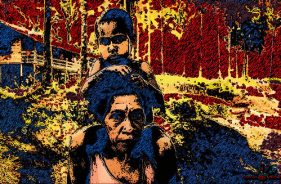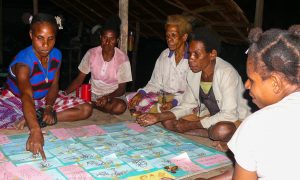Indonesia is beginning a new chapter in its democracy. In the midst of increasing number of expressive platforms, state power is actually tightening its supervision. It is not impossible: expressions considered detrimental to certain parties in power will be muzzled on behalf of the state.
A recent case involves the criminalisation of two Indonesian NGO activists, Fatia Maulidiyanti (Coordinator of the Commission for Missing Persons and Victims of Violence, or KontraS) and Haris Azhar (Director of Lokataru). The two activists were reported to the Jaya Metro Regional Police by Indonesia’s Coordinating Minister for Maritime Affairs and Investment, Luhut Binsar Panjaitan, accusing them of defamation.
This began when Fatia and Haris recorded and uploaded to Youtube their discussion of the results of research conducted by a number of large Indonesian NGOs—such as WALHI, Jatam, YLBHI, Kontras, and Pustaka—titled “Economic-Political Military Placement in Papua: The Case of Intan Jaya.” The video appeared on Haris Azhar’s Youtube channel in August 2021 with the title “There is Lord Luhut Behind Economic Relations-OPS Military Intan Jaya.”
In that video Fatia and Haris revealed that a number of retired Indonesian National Army (TNI) were involved in gold mining business and plans to exploit the Wabu Block area in Intan Jaya, Papua, which allegedly led to economic crimes. Luhut was directly mentioned: now retired he is still actively involved in Jokowi’s government. On that basis, Fatia and Haris were visited by police shortly after the video went public.
Their position could be seen as a reimagining of, to borrow Ariel Heryanto’s term, the post-colonial public intellectual in Indonesia. With an academic basis in the research conducted by a number of large NGOs in Indonesia, Fatia and Haris spoke with a “style” that is in harmony with the character of the Indonesian public.
The embedding of “public intellectuals” deserves to be given to Fatia and Haris, as well as all parties who have an important role in the research process. It seems to give our democracy a breath of fresh air in delivering comments and criticisms. However, Luhut’s oppressive response reveals the same irony that Heryanto illustrates in the characteristics of the post-colonial intellectual in Indonesia during the New Order.
First, public intellectual groups in Indonesia often gain public influence or trust because they have experienced oppression by authorities who try to eliminate their voices. However, this act of oppression actually strengthens their message. As Heryanto summarises: “Detention in police custody often generates respect and boosts the credentials of young activists.” Efforts to criminalise Fatia and Haris actually consolidated resistance to Luhut’s power.
After Fatia and Haris were reported, several NGOs belonging to the civil society coalition supported the two men to report Luhut to the police for alleged economic crimes of accepting gratifications, along with several Australian mining companies. Unfortunately, the report was immediately rejected by the police. Unlike Luhut’s report, which was quickly processed, theirs was immediately rejected.
All the evidence submitted was based on scientific findings and official state documents. Not only that, they also received a wave of public support. Through various social media platforms, the public showed their support with the hashtag “We are with Fatia and Haris.”
Invisible victims of the Papua conflict: the Nduga Regency refugees
The Indonesian government could regain trust by enhancing cooperation with those in the local community already involved in assisting IDPs
Second, the actions of public intellectuals in challenging the status quo of gives them special status to perform such actions. Simply put, they will be the public’s reference in response to phenomena that intersect with power. Returning pressure onto public intellectuals, as Luhut did, will only increase the public’s support for the dissenters. Furthermore, it will etch the names of public intellectuals into people’s memories.
These two things at least show that the flow of civil movement and Indonesian criticism is still alive on the one hand. Activism is never tolerated by the oppressor. However, on the other hand this is also a bad sign for the Indonesia’s democracy today. If public intellectual activism still inherits the context faced by post-colonial intellectuals of the New Order, then the power entrenched in Indonesia also retains those patterns, which is precisely the authoritarianism of the New Order.
Luhut’s actions leave at least two black stains on democracy in Indonesia today. First, there is anti-intellectualism, which is used to silence opposition voices that harm the interests of power. Luhut tried to muzzle public intellectualism and undermine freedom of expression. It is clear that these intellectuals and the research they are publicising strongly threatens Luhut’s interests in the mining business in Papua.
Second, the function of the police is again as an apparatus for the right hand of power. Instead of conducting objective law enforcement, the police force becomes a tool to silence public expression. This is done solely to protect the interests of the rulers. The case is still rolling. In the process, the reputation of Indonesian democracy is again at stake.
 Facebook
Facebook  Twitter
Twitter  Soundcloud
Soundcloud  Youtube
Youtube  Rss
Rss 



